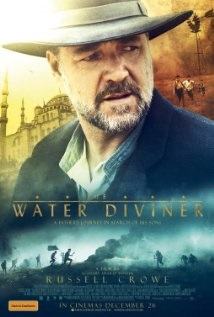‘Back to Gelibolu’, Honest History, 22 December 2014
Honest History committee member Alison Broinowski reviews The Water Diviner, opening in theatres on Boxing Day
‘Gallipoli!’ demands Joshua Connor of a Turkish immigration clerk. ‘I want to go to Gallipoli!’ It is 1919 and the Mallee farmer (Russell Crowe) has ingested the Anglo-narrative of the invasion, heroism, sacrifice, and all. He has lost three sons in it, and his wife, her last wish before her suicide being that Joshua should find their sons and bring them home.
 Joshua soon learns from a courteous Turkish army officer (Yilmaz Erdogan) the vital statistics of the invasion – some 85 000 Turkish dead, 26 000 Australian casualties. The Turks, he hadn’t realised, were defending their homeland, while the Allies were fighting – for what? ‘A principle’, says Joshua, at which the Turks laugh knowingly, telling him war is always about territory. Australia’s got enough land already, he says. But he doesn’t go into what the principle might be or what territorial ambitions Australia’s British allies had, leaving those for filmgoers to reflect on.
Joshua soon learns from a courteous Turkish army officer (Yilmaz Erdogan) the vital statistics of the invasion – some 85 000 Turkish dead, 26 000 Australian casualties. The Turks, he hadn’t realised, were defending their homeland, while the Allies were fighting – for what? ‘A principle’, says Joshua, at which the Turks laugh knowingly, telling him war is always about territory. Australia’s got enough land already, he says. But he doesn’t go into what the principle might be or what territorial ambitions Australia’s British allies had, leaving those for filmgoers to reflect on.
An Australian colonel working with the world’s first war graves commission has to remind his sergeant that World War I is over. But it’s not over for the Turks, who are still contesting territory (as they have for more than a millennium) with the Greeks.
A Kiwi soldier, a young British naval lieutenant, and several Turkish nationalists at personal risk, speed Joshua on his way to search for his missing sons. He is a successful water diviner and can sense exactly where his sons died at Lone Pine, to the amazement of the war graves teams. The remains of two sons are found. Later there are revealed the fate of the third son and the outcome of Joshua’s search for him through beautiful Turkish villages amid ongoing violent conflict. I won’t spoil the story here for moviegoers waiting to see the film in the New Year.
Dedicated to avoiding Anzackery, particularly in 2015, I was talked into seeing the preview of The Water Diviner and was rewarded and relieved. It avoids all the CEW Beanery that I anticipated and shrewdly subverts a lot of it. I never watch physical violence, so all I know of the film’s flashbacks to 1915 is the loud soundtrack; I’ll leave commentary on that to more honest historians. But they may find themselves sharing, as I did, the Turkish defenders’ delight when, after eight months, the Allies withdraw. One in the eye for our militaristic national culture.
Note: comments now posted here. HH.


The Water Diviner, viewed as a movie, is a bit of a mixture – part romance, part war movie, part Odyssey – but it gives us the context that is so often lacking in Australian views of war, particularly this war: it points out that Turkish casualties Canakkale-Gallipoli-The Dardanelles Campaign were many times Australian casualties; it gives overall war casualty figures at the end, not just the hackneyed number of ’62 000 Australian dead’; it brings home the family impact particularly poignantly with the suicide of the mother of the three missing soldier boys and the father’s regret at letting his sons go to serve King and Country; it sees the fighting as much from the Turkish as the Australian side; it gives us some international history (Greeks vs Turks) not involving Australians at all. While the Odyssey part of the story is far-fetched the ‘moral’ of the film is clearly anti-war and anti-jingoism. The treatment of Islamic culture is respectful and the Turks, when speaking to other Turks, are allowed to speak Turkish with sub-titles rather than English with hokey accents. The battle scenes are gruesome, as are the scenes of dying soldiers; they belie the gentle euphemism ‘fallen’ for deaths in such circumstances. While The Water Diviner is by no means flawless, its view of war contrasts nicely with the refurbished World War I galleries at the Australian War Memorial, an advertisement for which (using the orotund voice talent of Dr Brendan Nelson) preceded the movie at Dendy Canberra on Boxing Day. David Stephens